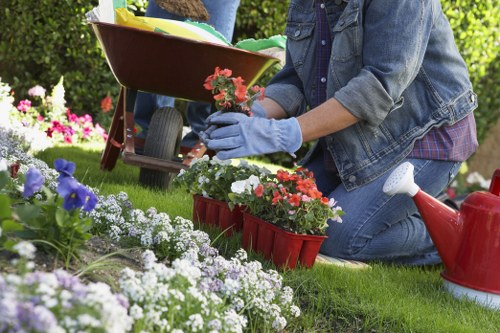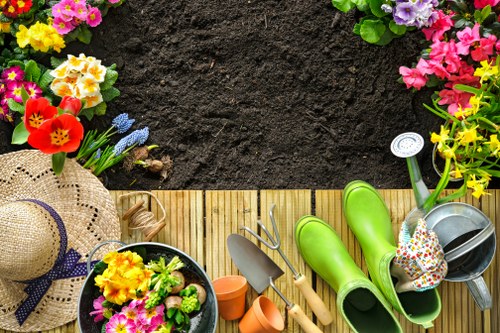Comprehensive Guide to Garden Maintenance in Stoke Newington

Introduction to Garden Maintenance
Maintaining a beautiful garden in Stoke Newington requires dedication, knowledge, and the right techniques. Whether you are a seasoned gardener or a novice, understanding the essentials of garden maintenance will ensure your outdoor space remains vibrant and healthy throughout the year. In this guide, we will explore various aspects of garden maintenance tailored specifically for the Stoke Newington area.
Stoke Newington’s unique climate and soil conditions present both opportunities and challenges for gardeners. By implementing the right strategies, you can create a flourishing garden that enhances the beauty of your home and provides a serene environment for relaxation.
From seasonal tasks to selecting the appropriate plants, this article covers all you need to know to keep your Stoke Newington garden in top shape.

Understanding Stoke Newington’s Climate
Climate Overview
Stoke Newington experiences a temperate maritime climate, characterized by mild summers, cool winters, and moderate rainfall throughout the year. This climate allows for a wide variety of plants to thrive, but it also requires specific maintenance practices to address seasonal changes.
Seasonal Gardening Tips
Adapting your garden maintenance routine to the changing seasons is crucial in Stoke Newington. Here are some seasonal tips:
- Spring: Focus on planting new flowers and vegetables, pruning shrubs, and preparing the soil.
- Summer: Ensure regular watering, mulch to retain moisture, and control pests.
- Autumn: Clean up fallen leaves, plant bulbs for spring, and protect delicate plants from early frosts.
- Winter: Prune trees, plan your garden layout for the next year, and protect plants from extreme cold.

Essential Garden Maintenance Tasks
Lawn Care
A well-maintained lawn is the cornerstone of any beautiful garden. Regular mowing, aeration, and fertilization are essential to keep your grass healthy and lush.
Mowing Tips
Maintain your lawn by mowing it regularly, ensuring you never cut more than one-third of the grass height at a time. This promotes stronger root growth and prevents grass from becoming stressed.
Pruning and Trimming
Pruning helps control the shape of your plants, encourages healthy growth, and prevents the spread of diseases. Focus on removing dead or diseased branches and shaping shrubs to enhance their appearance.
Tools for Pruning
Invest in high-quality pruning shears, loppers, and a pruning saw to handle different types of branches and maintain precision in your cuts.

Soil Management
Soil Testing
Understanding the pH and nutrient levels of your soil is vital for selecting the right plants and ensuring their optimal growth. Conduct a soil test to identify any deficiencies and amend the soil accordingly.
Composting
Creating a compost pile is an excellent way to recycle garden waste and produce nutrient-rich compost. Use compost to improve soil structure, retain moisture, and provide essential nutrients to your plants.
- Materials to include: Vegetable scraps, grass clippings, and dried leaves.
- Materials to avoid: Meat, dairy products, and diseased plants.

Plant Selection and Care
Choosing the Right Plants
Selecting plants that are well-suited to Stoke Newington’s climate and soil conditions will significantly reduce maintenance efforts and enhance garden beauty. Consider native species and those that thrive in your specific garden environment.
Watering Techniques
Proper watering is crucial for plant health. Water your garden early in the morning to reduce evaporation and fungal growth. Use drip irrigation or soaker hoses to deliver water directly to the roots.
Mulching Benefits
Applying mulch around your plants helps retain soil moisture, suppress weeds, and regulate soil temperature. Organic mulches, such as bark or straw, also add nutrients to the soil as they decompose.
Pest and Disease Management
Preventing and managing pests and diseases is essential for maintaining a healthy garden. Regularly inspect plants for signs of trouble and use organic or chemical treatments as needed to control infestations.
- Natural Remedies: Introduce beneficial insects like ladybugs and use neem oil sprays.
- Chemical Treatments: Apply appropriate pesticides, following the manufacturer’s instructions to minimize environmental impact.

Hardscaping and Garden Structures
Paths and Patios
Incorporating paths and patios into your garden design enhances functionality and aesthetic appeal. Use materials like gravel, paving stones, or brick to create inviting walkways and outdoor living spaces.
Fencing and Boundaries
Fences provide privacy, define garden boundaries, and can act as supports for climbing plants. Choose from a variety of styles and materials to complement your garden’s overall design.
Irrigation Systems
Installing an efficient irrigation system can save time and ensure your plants receive consistent moisture. Consider automated systems with timers for convenience.
Lighting Solutions
Garden lighting enhances the beauty of your outdoor space and allows you to enjoy your garden even after dark. Use solar-powered lights, LED fixtures, or lanterns to create a welcoming ambiance.

Seasonal Garden Maintenance Checklist
Spring Checklist
- Plant new flowers and vegetables.
- Prune shrubs and trees.
- Prepare soil with compost and fertilizers.
- Clean garden tools and equipment.
Summer Checklist
- Water plants regularly and deeply.
- Apply mulch to retain soil moisture.
- Monitor for pests and diseases.
- Deadhead flowers to encourage continuous blooming.
Autumn Checklist
- Remove fallen leaves and debris.
- Plant bulbs for spring flowering.
- Protect plants from early frosts.
- Store garden furniture and equipment properly.
Winter Checklist
- Prune trees and shrubs.
- Plan garden layout for the upcoming year.
- Protect delicate plants with mulch or covers.
- Inspect and repair garden structures.

Organic Gardening Practices
Benefits of Organic Gardening
Organic gardening promotes a healthy ecosystem, reduces chemical usage, and yields safer, more nutritious produce. By embracing organic practices, you contribute to environmental sustainability and enjoy a more natural gardening experience.
Composting and Soil Health
Composting enriches the soil with essential nutrients and improves its structure. Healthy soil supports robust plant growth and resilience against pests and diseases.
Natural Fertilizers
Use natural fertilizers such as fish emulsion, bone meal, and seaweed extract to provide plants with necessary nutrients without harming the environment.
Biological Pest Control
Introduce beneficial insects like bees, butterflies, and predatory beetles to control pest populations naturally. Encourage biodiversity in your garden to maintain a balanced ecosystem.
- Attract pollinators: Plant a variety of flowers to support bees and butterflies.
- Encourage predators: Provide habitats for ladybugs and lacewings.

Sustainable Garden Practices
Water Conservation
Implementing water-efficient practices helps conserve this vital resource. Use rain barrels to collect rainwater, and opt for drought-resistant plants to minimize water usage.
Energy-Efficient Lighting
Choose energy-efficient lighting options such as LED or solar-powered fixtures to reduce energy consumption and lower your garden’s carbon footprint.
Composting Toilets
For larger garden projects, consider composting toilets to manage waste sustainably and enhance soil fertility through composting.
Recycling and Upcycling
Repurpose materials like old pallets, tires, and containers to create unique garden structures and reduce waste. Recycling not only benefits the environment but also adds character to your garden.
- Pallet Gardens: Use old pallets to create vertical gardens or raised planting beds.
- Repurposed Containers: Turn old tires or buckets into creative plant holders.

Hiring Professional Garden Maintenance Services
Benefits of Professional Help
While DIY gardening is rewarding, hiring professional garden maintenance services in Stoke Newington can save time, ensure expert care, and enhance the overall health of your garden. Professionals bring specialized knowledge and equipment to handle complex tasks efficiently.
Choosing the Right Service
Select a reputable garden maintenance company that understands the specific needs of Stoke Newington gardens. Look for experienced professionals who offer a range of services tailored to your requirements.
Key Considerations
- Experience: Choose a service with a proven track record in garden maintenance.
- Services Offered: Ensure they provide comprehensive services, including lawn care, pruning, soil management, and pest control.
- Customer Reviews: Check testimonials and reviews to gauge customer satisfaction.
Cost vs. Value
Investing in professional garden maintenance can lead to long-term savings by preventing costly repairs and replacing damaged plants. Consider the value of having a consistently well-maintained garden that enhances your property’s curb appeal.
Customized Maintenance Plans
Many professionals offer customized maintenance plans tailored to your garden’s specific needs, ensuring optimal care and attention throughout the year.

DIY Garden Maintenance Tips
Time Management
Effective time management is essential for maintaining a beautiful garden without feeling overwhelmed. Create a maintenance schedule that outlines daily, weekly, and monthly tasks to stay organized and ensure all aspects of your garden receive attention.
Tool Maintenance
Keeping your garden tools in good condition extends their lifespan and ensures they function effectively. Regularly clean, sharpen, and store tools properly to maintain their performance.
Essential Tools
- Pruning shears
- Lawn mower
- Garden hose
- Shovel and spade
- Wheelbarrow
Plant Care Tips
Consistent plant care is crucial for a thriving garden. Ensure plants receive adequate sunlight, water, and nutrients. Regularly check for signs of stress or disease and address issues promptly to prevent further damage.
Mulching Techniques
Apply a layer of mulch around your plants to conserve moisture, suppress weeds, and improve soil health. Organic mulches are preferable as they enrich the soil as they break down.

Enhancing Garden Aesthetics
Plant Arrangement
Thoughtful plant arrangement can significantly enhance the visual appeal of your garden. Consider factors such as color coordination, plant height, and blooming seasons to create a harmonious and attractive landscape.
Garden Decorations
Incorporate decorations like sculptures, fountains, and garden ornaments to add character and personal touch to your outdoor space. These elements can serve as focal points and enhance the overall ambiance.
Choosing Decorations
- Select weather-resistant materials like stone, metal, or treated wood.
- Opt for designs that complement your garden’s theme and your personal style.
Pathways and Borders
Create clear pathways and borders to define different areas of your garden. This not only improves functionality but also adds structure and order to the landscape.
Materials for Pathways
Choose materials that are durable and aesthetically pleasing, such as gravel, stepping stones, or brick pavers, to construct pathways that blend seamlessly with your garden design.

Sustainable Gardening in Stoke Newington
Organic Practices
Embrace organic gardening practices to promote sustainability and reduce environmental impact. Avoid synthetic chemicals, use natural fertilizers, and encourage biodiversity to create a resilient and eco-friendly garden.
Water Management
Implementing efficient water management systems is key to sustainable gardening. Use rain barrels, drip irrigation, and moisture-retentive mulches to optimize water usage and reduce waste.
Rainwater Harvesting
Collecting and storing rainwater can provide a sustainable water source for your garden. Install rain barrels or cisterns to capture runoff from your roof and use it to irrigate your plants.
Energy Efficiency
Incorporate energy-efficient practices into your garden maintenance routine. Use solar-powered lighting, energy-saving tools, and sustainable materials to minimize your garden’s energy footprint.

Community and Garden Clubs in Stoke Newington
Joining Local Garden Clubs
Participating in local garden clubs and community groups can provide valuable resources, support, and inspiration for your garden maintenance efforts. Connect with fellow gardening enthusiasts to share tips, exchange plants, and collaborate on community garden projects.
Workshops and Events
Attend workshops and events organized by local garden centers or community organizations to enhance your gardening knowledge and skills. These events offer hands-on learning opportunities and access to expert advice.
Benefits of Community Gardening
- Fosters a sense of community and collaboration.
- Provides access to shared resources and tools.
- Encourages sustainable and collective gardening practices.
Networking with Experts
Building connections with gardening experts and professionals in Stoke Newington can provide ongoing support and guidance. Leverage these networks to stay updated on the latest gardening trends and best practices.

Conclusion
Effective garden maintenance in Stoke Newington involves a combination of understanding the local climate, selecting appropriate plants, and implementing sustainable practices. By following the guidelines outlined in this article, you can create and maintain a beautiful, healthy garden that enhances your living space and contributes to the community’s green landscape.
Whether you choose to manage your garden independently or seek the expertise of professional gardeners, consistent care and attention are key to achieving a thriving outdoor sanctuary.
Ready to transform your garden? Contact us today to book your garden maintenance service and enjoy a lush, vibrant garden all year round!

